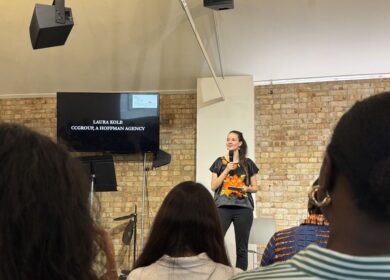By Giuseppina Chiaramonte
The Hoffman Agency, San Jose
Last week we chatted with Burghardt Tenderich, associate professor at the University of Southern California’s Annenberg School for Communication, to hear his take on the benefits of studying PR and how the changing industry impacts the Comms curriculum.
This week we had the chance to catch up with Professor Charles Byers of the Business and Marketing Departments at Santa Clara University, for his input.
Like Tenderich, Byers echoes the importance of understanding the guiding principles of PR – something you can only really get from studying the subject.
Here’s what he had to say:
HA: Thanks so much for taking the time to chat. Let’s jump right in – what would you say are the top benefits to pursuing a degree in communications versus pursuing a degree in another subject and then just learning about comms “out in the field”?
Byers: I think the main benefit is that you learn and understand the theories and principles that define the communications process. Understanding the “why” and the “how” are becoming more critical as the number of “non-communications” people are moving into marketing and communications positions.
HA: How does this help PR students when they join the workforce?
Byers: I think the theory and principles background drives a stronger strategic approach and provides the intellectual depth required to successfully defend and answer questions from decision makers and professionals in other fields of endeavor who participate in or are responsible for communications decisions, processes and tactics.
HA: As you know, the public relations industry is changing. It’s moving so quickly that it’s sometimes hard for PR professionals – and even agencies – to keep up. How do you keep your curriculum fresh and relevant to the changes that are taking place?
Byers: Interesting question. First, I think we have to understand what has evolved, what has changed and what has not changed. We also need to understand what changes are relevant … not all are … what changes are fads and what changes are related. And, by the way, a communications-related education helps to define these distinctions.
HA: So what hasn’t changed and what has?
Byers: First, the process of communications has not changed, and probably won’t change, over time. Humans are humans, and as long as we are human we will process and act upon information that meets our wants, needs and demands consistently over time. Communications models and theory will evolve.
What is problematic is the preponderance of tactical information that is out there today. Here is where the challenge comes, because it is not a matter of keeping up, it is a matter of figuring out what is relevant and what is not. There is an overwhelming amount of information out there, and in my opinion, most of it is not relevant or is merely saying the same thing using different language. There seems to be more “noise” and less really important, useful information and data.
HA: That’s a good point.
Byers: So, then, how do I keep my curriculum up-to-date? First, I spend a great deal of time reading, analyzing and cataloging that allows me to separate the relevant from the irrelevant. Secondly, I still have a very active consulting practice that keeps me constantly in-tune with the character of today’s communications challenges.
HA: So what is the one thing you want students to take away from your courses – the one thing that will help them succeed in the workforce?
Byers: I want them to walk away from my classes knowing how to think. By that I mean understanding and applying a step-by-step thought process. This includes the ability to gather information (research), synthesize the information, define alternatives, recommend an alternative and support that alternative with data … and to do so through succinct and compelling communications, both visual and verbal. This is the universal skill set that will serve them well no matter where they go in life. Tactics will change. Strategies will change. Therefore, the ability to think is paramount.
The main takeaway from this interview series is that thinking is critical to the PR profession. You’ve got to be able to process information before you can outline (and execute on) a winning plan for your client. And studying PR and communications can make that happen.


